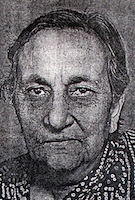Hamida Saiduzzafar
Hamida Saiduzzafar | |
|---|---|
 | |
| Born | 16 July 1921 Nainital |
| Died | 1988 |
| Other names | Hamida Said-uz-Zafar |
| Occupation | Ophthalmologist |
| Relatives | Rashid Jahan (sister-in-law) |
Hamida Saiduzzafar (16 July 1921 – 1988) was an Indian ophthalmologist.
Early life[]
Saiduzzafar was born in Nainital, the daughter of Sahibzada Saiduzzafar Khan and Shaukat Ara Begum.[1] Her father was a physician and medical school professor in Lucknow. She earned a medical degree from King George's Medical College in Lucknow, and a doctorate in ophthalmology at the University of London. While in England, she trained at Moorfields Eye Hospital, and did further work in glaucoma research in London.[2]
Writer Rashid Jahan was Saiduzzafar's sister-in-law.[3][4][5] Performers Uzra Butt and Zohra Sehgal were her cousins.[6]
Career[]
Saiduzzafar was an ophthalmic surgeon in Aligharh, at the Gandhi Eye Hospital. From 1978 to 1981, she was a professor at Aligarh Muslim University. In 1982, she received the Distinguished Woman Award from Banaras Hindu University. In 1987, she worked with the World Health Organization on blindness and glaucoma.[2] She published research in the British Journal of Ophthalmology,[7][8] the Indian Journal of Ophthalmology,[9][10] and Experimental Eye Research.[11][12]
Saiduzzafar was a member of the British Medical Association, the Ophthalmological Society of the United Kingdom, the All India Ophthalmological Society, the National Society for Prevention of Blindness, and many other organizations. She was a fellow of the Royal Society of Medicine. She wrote an autobiography, published posthumously in 1996.[1][2]
Saiduzzafar was known to be an avid birdwatcher, lectured on birds, and contributed articles to a birdwatchers' newsletter, and to the journal of the Bombay Natural History Society.[1]
Personal life[]
Hamida Saiduzzafar died in 1988, from a stroke,[1] in her mid-sixties.[2]
References[]
- ^ a b c d Urfi, Jamil (2020-05-01). "Remembering Dr. Hamida Saiduzzafar: A birdwatcher par excellence". Karvaan India. Retrieved 2020-10-18.
- ^ a b c d Chattopadhyay, Anjana (2018). Women Scientists in India: Lives, Struggles & Achievements (PDF). National Book Trust, India. ISBN 978-81-237-8144-0.
- ^ Mirza, Begum Khurshid (2005). A Woman of Substance: The Memoirs of Begum Khurshid Mirza, 1918-1989. Zubaan. p. 87. ISBN 978-81-89013-31-8.
- ^ Saiduzzafar, Hamida (1987). "JSAL interviews DR. HAMIDA SAIDUZZAFAR: A conversation with Rashid Jahan's sister-in-law, Aligarh, 1973". Journal of South Asian Literature. 22 (1): 158–165. ISSN 0091-5637. JSTOR 40873940.
- ^ Jalil, Rakhshanda (January 2012). "Rashid Jahan: The 'Bad Girl' of Urdu Literature". Sangat Book Review. Retrieved 2020-10-18.
- ^ Lambert-Hurley, Siobhan (2018-07-31). Elusive Lives: Gender, Autobiography, and the Self in Muslim South Asia. Stanford University Press. ISBN 978-1-5036-0652-4.
- ^ Saiduzzafar, Hamida (1959-11-01). "Variant of Duane's Retraction Syndrome". British Journal of Ophthalmology. 43 (11): 700–702. doi:10.1136/bjo.43.11.700. ISSN 0007-1161. PMC 509882. PMID 14440804.
- ^ Saiduzzafar, Hamida (1962-12-01). "Studies in Ocular Rigidity". British Journal of Ophthalmology. 46 (12): 717–729. doi:10.1136/bjo.46.12.717. ISSN 0007-1161. PMC 510277. PMID 18170842.
- ^ Saiduzzafar Hamida (1959-01-01). "The effect of citral on variations in the aqueous outflow facility of rabbits". Indian Journal of Ophthalmology. 7 (2): 39–42.
- ^ Saiduzzafar Hamida; Pradhan J; Gogi R (1969-01-01). "Peripheral iridectomy with scleral cautery - a simple technique". Indian Journal of Ophthalmology. 17 (1): 11–13. PMID 5371044.
- ^ Perkins, E. S.; Saiduzzafar, Hamida (1969-10-01). "The effect of plasmin on the facility of outflow in cynomolgus monkeys". Experimental Eye Research. 8 (4): 386–396. doi:10.1016/S0014-4835(69)80003-5. ISSN 0014-4835. PMID 4243139.
- ^ Saiduzzafar, Hamida (1970-10-01). "Tissue fibrinolytic activity in the anterior segment of the eye, as related to aqueous outflow". Experimental Eye Research. 10 (2): 297–301. doi:10.1016/S0014-4835(70)80041-0. ISSN 0014-4835. PMID 4249557.
- 1921 births
- 1988 deaths
- Indian ophthalmologists
- Indian women scientists
- Indian scientists
- Aligarh Muslim University faculty